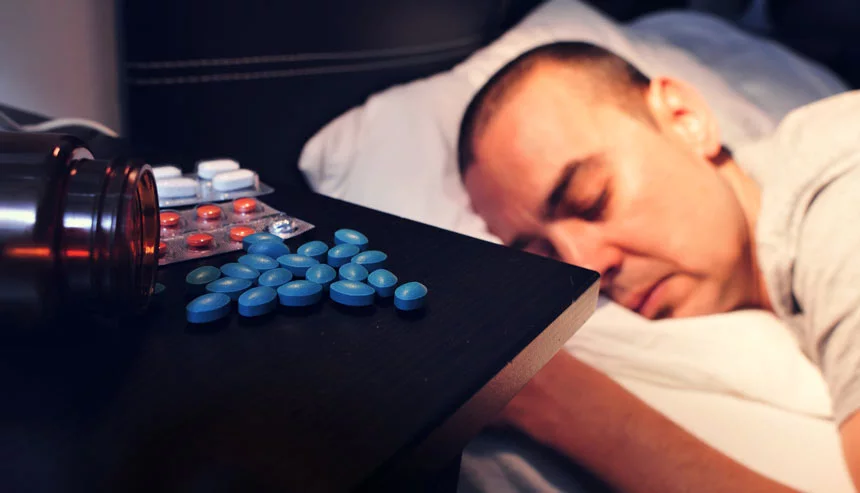Developing an Ambien Dependence
Table of Contents
At one point in your life, you looked forward to taking your Ambien sleep aid because you knew it meant you’d soon get to enjoy a restful night’s sleep. That has since changed, and now you’re wondering if you need Ambien addiction treatment.
You may be asking yourself, can people becomeaddicted to Ambien? While the road ahead may be a challenging one, understanding what to expect from Ambien addiction treatment will help make it much easier.
Keep reading to find out more regarding Ambien dependence and effective forms of treatment!
Ambien Treatment Requires Professional Help
Before we delve into the details oftreating Ambienaddiction, it’s important to first note that the process should be assisted by a professional treatment provider. Ambien is an extremely powerful drug which is commonly prescribed as sleep medication. It’s able to literally slow brain activity, affecting the central nervous system, which is how it induces sleep.
A drug with that kind of power is not one you can usually safely quitcold turkey. It is a prescription medication and belongs to a class of drugs called sedative-hypnotics (or sleep medications), which help the brain produce chemicals that relax the muscles and calm the nerves.
Ambien helps you fall asleep quickly and stay asleep all night long. It works by affecting certain neurotransmitters in the brain, like GABA (gamma-aminobutyric acid). This neurotransmitter is responsible for calming signals sent throughout your nervous system, including messages between neurons in your brain.
Ambien doesn’t just affect GABA levels in your brain — it also affects levels of histamine in your body, which helps explain why some people experience itching and tingling sensations while taking this drug.
Speak to your doctor about your addiction. They will have advice on how to taper off the drug, little by little so that you don’t suffer any severe side effects that could put your health in far greater danger.
The Dangers of Ambien Addiction

The sooner you begin seekingAmbien addictiontreatment, the better. Although the drug can certainly be used safely, it’s also extremely dangerous to those who have become addicted. In fact,ER visits related to Ambien have increasedby 230% over the past 7 years. That’s about 20,000moreincidents. A substance use disorder should not be taken lightly.
Even when taken exactly as a doctor orders, it’s possible to become addicted to Ambien. The signs that you may be engaging in Ambien abuse that we’re about to cover should further illustrate how dangerous this Schedule IV controlled substance can truly be. Therefore, if you think you’re at risk of being addicted, it’s imperative you seek treatment right away.
8 Signs You Need Ambien Addiction Treatment
Even if you think there’s only aslightchance that you may be addicted to Ambien, it’s best that you see your doctor and express your concerns. They’ll be able to help you better understand whether you’re addicted or not and what to do next.
However, the following are telltale signs that you most likely need treatment forAmbien addiction.
1. Any “Complex Behaviors”
By far, the most glaring sign that you need Ambien addiction treatment as soon as possible is what is known as “complex behaviors.” In short, this refers to actions an individual takes while under the influence of Ambien that they have no – or almost no – memory of doing later. In this way, complex behaviors are a lot like sleepwalking, except they can be far riskier. This symptom is actually fairly common among persons struggling with substance abuse habits. This side effect is one of the scarier adverse consequences to excessively and habitually using central nervous system depressants.
Common examples include:
- Preparing and Eating Food
- Having Sex (Even with Strangers)
- Driving a Car (“Sleep-Driving”)
That last one is obviously the most worrisome. “Sleep-driving” can easily be fatal as the driver is operating a motor vehicle without being fully awake.
2. Mixing Ambien with Other Drugs
Ambien is plenty powerful all by itself, so it’s alarming if someone begins taking it along with other substances. Many people who abuse Ambien do sowhile drinking alcohol. However, it’s not uncommon for people to take Ambien to help them come down from using other drugs like cocaine or meth.
Polysubstance abuse in this way has a whole host of negative consequences that come with it. In fact, the combined effects of these drugs can result in an increased risk of even moredangerous versions of complex behaviors. Of course, they can also cause death.
3. Severe Side Effects

Manyprescription drugscome with certain side effects, some of which may even be unpleasant. That said, Ambien addiction can cause severe side effects that threaten the user’s health far more than the drug itself is helping it. If you experience any of the following side effects, consider treatment right away:
- Diarrhea
- Drowsiness
- Feeling Sedated
- Hallucinations
- Headache
- Lightheadedness
- Nausea
- Pain in muscles or joints
- Problems with Balance, Walking, and Coordination
- Shakiness
- Stomach Pain
- Strange Dreams
Ambien abuse can also cause or exacerbate mental disorders. It may cause people to feel depressed or make preexisting feelings of depression much worse. In some cases, Ambien dependence even leads to suicidal thoughts.
4. Escalated Doses
Anytime someone begins taking more of a prescription drug than their doctor directed, they have most likely formed an addiction and therefore, a pattern of drug abuse. Some people begin escalating their doses of Ambien because they believe it’s the only way to get to sleep. It’s not that theywantto, it’s that they feel theyneedto in order to get to bed.
Often, these people believe that they aren’t actually abusing Ambien, but instead engaging with the most valid and convenient treatment options for their problem. Unfortunately, Ambien only helps you fall asleep. It doesn’t ensure you’ll stay asleep.
In any case, even if you’re not addicted to Ambien use when you begin doing it, increasing the amount of Ambien you take will almost always end in addiction. Among other things, it’s extremely easy tobuild a tolerance to Ambien, or indeed, most clinical sleep medicine.
What begins as an innocent attempt to replicate an earlier effect and treat insomnia becomes a self-perpetuating cycle as the user must keep taking Ambien and upping their usage by taking larger doses until eventually, they have lost control over their use.
5. Changing the Method of Dosage
One way some users try to get around the problem of forming a physical dependence and Ambien addiction is by changing the way they take it. By crushing it up and snorting it through their nostrils, for example, they can introduce it to their system much quicker. Again, this would be a major warning sign that seeking addiction treatment is necessary right away.
6. Signs of Intoxication
Whether someone is mixing Ambien use with alcohol or not, if they’re addicted to the drug, they may show symptoms that are similar to those of intoxication. These would include:
- Impaired Attention
- Poor Coordination
- Problems Walking
- Shifting Eye Movements
- Short-Term Memory Loss
- Slurred Speech
7. Isolation from Friends and Family
Anyone with an addiction will have a harder time focusing on anything else than their drug of choice. Substance abuse and drug addiction tend to be habits that are all-consuming. Those who are addicted to Ambien may become especially isolated because the drug puts them to sleep or otherwise impairs them to the point that they can’t be social.
If you’re choosing to take Ambien instead of hanging out with friends, spending time with your family, or going to work, you’ve most likely formed a drug addiction.
8. Accidents and Injuries
Aside from the dangers posed by complex behaviors, Ambien addiction can result in accidents and injuries. Someone who is stuck in the habit of Ambien abuse and, therefore, can’t concentrate may cause a car accident, for example.
What Does Ambien Addiction Treatment Process Entail?

Now that you better understand the warningsigns that you have a substance abuse issue, let’s discuss what Ambien addiction treatment involves.
Will Quitting Ambien Cause Withdrawal?
Withdrawal symptoms are always a common concern among people who are quitting a drug. Unfortunately, it’s almost always unavoidable, too. The actual symptoms related to withdrawal that individual experiences will depend on their own level of use – how long they took the drug and how much of it, among other things. It usually lasts between a few days and a few weeks, though.
Insomnia is the most common withdrawal symptom of Ambien abuse. This results from the body adapting to the sedative effects of Ambien over time. When you suddenly stop taking Ambien, your brain may not be able to sleep without it; this can cause a type of rebound insomnia. If you experience withdrawal symptoms like insomnia, you should talk with your doctor about treatment options that can help you get through the worst of it.
Other commonsymptoms of Ambien withdrawalinclude:
- Anxiety
- Depression
- Hypertension
- Increased Pulse Rate
- Muscle Cramps
- Nausea/Vomiting
- Sweating
- Uncontrolled Shaking
Severe withdrawal symptoms from Ambien dependence may be a risk, too. Some people have experienced seizures or even gone into comas after quitting Ambien, which is one more reason it’s important to seek help from medical professionals at a treatment facility or rehab center with this process.
Tapering Off Ambien
As we mentioned earlier, most people who go through Ambien addiction treatment will actually begin by tapering off the drug, not simply quitting it outright. Your doctor may also prescribe other drugs to help with this transition or recommendover-the-counter sleep aids that will help you get some much-needed rest. For many people, completely cutting off drug use instead of tapering can be incredibly dangerous.
Steps to Ambien Addiction Treatment

Treatment practices differ depending on the specific rehab center. Every professionaltreatment centerwill operate a bit differently. However, most users will experience some combination of the following steps during treatment:
- A mental and physical health assessment
- An inventory of other drugs you’ve been taking
- Questions about any previous rehab/detox experiences you’ve had
- An inventory of any major sources of stress in your life
After that, the medical professional may recommend:
Detox
Excessive drug use should be considered a medical emergency. It is for this reason that Detox is considered an essential first step toward sobriety and breaking the habit of substance abuse. The health risks that go along with an unmonitored self-administered detox are many. This is where medically assisted detox sessions come into play. The best treatment centers understand that a good substance abuse treatment process involves monitoring a patient while their body goes through the withdrawal symptoms from abusing ambien and now, no longer having access to the substance.
Inpatient/Outpatient Treatment
When it comes to active treatment there are two major options; inpatient treatment and outpatient treatment. A good Ambien rehab program will offer the full spectrum of treatment options. This will include high-quality behavioral healthcare like group therapy and mental health counseling. It is important to remember when one seeks to begin treatment, that for the most part, addiction tends to have a link with a co-occurring mental disorder.
This is why a good treatment provider will have access to professionals capable of administering therapies that are in line with the gold standard of the behavioral health industry. Some of the more common therapies effective at helping those struggling to stop abusing Ambien are explored below.
Cognitive behavioral therapy (or CBT)
Is a specific form of psychotherapy that has been proven to be effective in treating a variety of mental health issues, including Ambien addiction. The idea behind cognitive behavioral therapy is that the way you think and how you feel are two sides of the same coin. If you can change how you think, it can help change how you feel.
CBT helps people identify and change negative thoughts, feelings, and behaviors by teaching them to recognize these negative thoughts, feelings and behaviors as they occur, then challenging them and replacing them with new, positive thoughts and behaviors.
The goal of cognitive behavioral therapy is to help people understand their own thought processes so they can find better ways to cope with stressors in their lives and make better decisions about how to handle their emotions when faced with difficult situations.
Contingency Management Programs
Work by rewarding people for positive behavior and punishing them for negative behavior. The idea is that this approach will encourage people to continue to do the right thing while discouraging them from doing the wrong thing.
In the case of Ambien addiction, this means rewarding patients who have not relapsed with vouchers or money. Clients who relapse are given an “abstinence violation,” which usually involves a fine or other punishment. A positive test result for drugs can also be considered an abstinence violation.
The idea behind contingency management programs is that they give people something to work towards. Most people want to be better than they are now and these programs provide a way for them to achieve that goal if they are willing to work hard enough at it. Studies have shown that contingency management programs can reduce relapse rates by up to 50%. This makes them one of the most effective treatments we have available today!
Support Groups (e.g. Pills Anonymous)
Support groups like Pills Anonymous grew out of a need for people with an addiction to find support and understanding from others who have been there. These groups can be found in many communities around the world.
Support groups are not just for those who share an addiction but also for family members and friends of addicts as well as professionals who work with substance abusers. The purpose of these groups is to provide a safe place where people can talk about their experiences without judgment or criticism from others in attendance. Members share their feelings about addiction, how it has affected them personally and how it affects their relationships with others in their lives.
Take the First Step Toward Ambien Addiction Treatment
If you recognize that you have become addicted to Ambien, don’t worry. There are countless treatment professionals out there who have already helped people in your exact same situation. You don’t have to live with this problem any longer.
If you are ready to receive treatment for drug use of any kind, contact our hotline at Find Addiction Rehabstoday to get help finding an appropriate Ambien treatment program near you.

